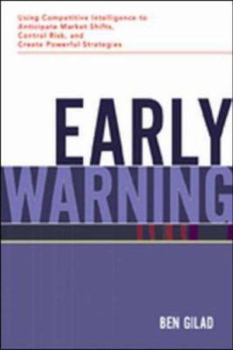Early Warning: Using Competitive Intelligence to Anticipate Market Shifts, Control Risk, and Create Powerful Strategies
Select Format
Select Condition 
Book Overview
With strong opinions and wry humor, world-recognized expert Benjamin Gilad reveals how to anticipate and react to early signs of trouble.Surprise is rarely a good thing in business. Unexpected... This description may be from another edition of this product.
Format:Hardcover
Language:English
ISBN:0814407862
ISBN13:9780814407868
Release Date:January 2003
Publisher:AMACOM/American Management Association
Length:268 Pages
Weight:1.28 lbs.
Dimensions:1.1" x 6.4" x 9.2"
Age Range:17 years and up
Grade Range:Grade 12 and higher
Customer Reviews
3 ratings
A very useful book
Published by Thriftbooks.com User , 20 years ago
Executives of big companies should read this book because the proposed method looks like an effective tool for companies to stay big. Executives of small companies should read the book because their bigger competitors may be reading it, and maneuvering against a large competitor who has a good early warning system could be tough. So if you're planning an asymmetric strategy, you better know what you're up against. Anyhow, even without any offensive intentions towards bigger companies, the leaders of small organizations should look into this book since lack of early warning can ruin small and big companies alike. I also recommend the book to students of management as an insight into the tricky subject of how organizations build an image of their environment. Most of the literature on that field tends to be written in a researcher-to-researcher style, like books on organizational sensemaking or cognitive oligopolies. This book stands out since it's clear, solution oriented and written for practitioners. Moreover, the book offers some solution to the never ending discussion regarding deliberate versus emergent strategy making. The book shows how to deal with a complex environment by understanding and monitoring it, instead of planning yourself to death with irrelevant tools or not planning at all. The book also discusses organizational politics that might block a competitive intelligence function since it often lacks the direct access to decision makers that governmental intelligence agencies usually enjoy in their arena.
Not disappointed
Published by Thriftbooks.com User , 20 years ago
I ordered this book based on the previous reviewer's comments, and I was not disappointed. If I have one criticism, the book format "looks" a bit like the mass market, superficial, self-agrandizing lot. However, in reality it's quite meaty, well referenced, and insightful with what so far appears to be theoretically sound as well as practical recommendations.
Core Reference for Business Leaders
Published by Thriftbooks.com User , 20 years ago
Edit of 21 Dec 07 to add links. This remains a core reference. Ben Gilad, arguably one of the top five practitioner-scholars in the competitive intelligence arena (the others, in my opinion, are Jan Herring and Leonard Fuld, his partners; Babette Bensoussan in Australia, and Mats Bjore in Sweden), makes a very important contribution with this book. It is for business leaders what Kristan Wheaton's book, was and is for government leaders. The author's earlier book, "Business Blindspots: replacing myths, beliefs and assumptions with market realities", remains one of the single best references for business intelligence professionals (but only available from Infonortics UK), together with Babette Bensoussan and Craig Fleisher's Strategic and Competitive Analysis: Methods and Techniques for Analyzing Business Competition I regard this book as being primarily for the manager of the business enterprise rather than the business intelligence professional, primarily because it is very helpful in breaking through old mind-sets and suggesting that very specific attitudes and activities must characterize those endeavors that wish to avoid costly surprises. I would say that this book, together with Yale business author Jeffrey Garten's book, The Politics of Fortune: A New Agenda For Business Leaders are "must reads" for the senior executive who desires to not just survive but to excel in the 21st Century. The author, who has a solid understanding of the history of surprise in military or national security circles, makes the point that surprise does not occur for lack of signs that can be detected, but for lack of a culture and mind-set open to seeing and understanding those signals. The book combines survey results from professionals attending the Academy of Competitive Intelligence (the single best offering in the world) with real-world accounts, "gray box" supplementals, and "manager's checklists" at the end of each chapter that are in essence an executive summary of the chapter. This is a 2-3 hour read, and well-worth anyone's time, but especially well-worth the time of the executive who is willing to consider the possibility that they are grossly unaware of real-world external threats to their future bonuses, and that there might be some relatively simple low-cost solutions to dealing with the threat that require, rather than vast sums of money, a change in mind-set. Other recommended works on my short list (with reviews): Measuring the Effectiveness of Competitive Intelligence: Assessing & Communicating CI's Value to Your Organization Keeping Abreast of Science and Technology: Technical Intelligence for Business The New Competitor Intelligence: The Complete Resource for Finding, Analyzing, and Using Information about Your Competitors The New Craft of Intelligence: Personal, Public, & Political--Citizen's Action Handbook for Fighting Terrorism, Genocide, Disease, Toxic Bombs, & Corruption THE SMART NATION ACT: Public Intelligence in the





